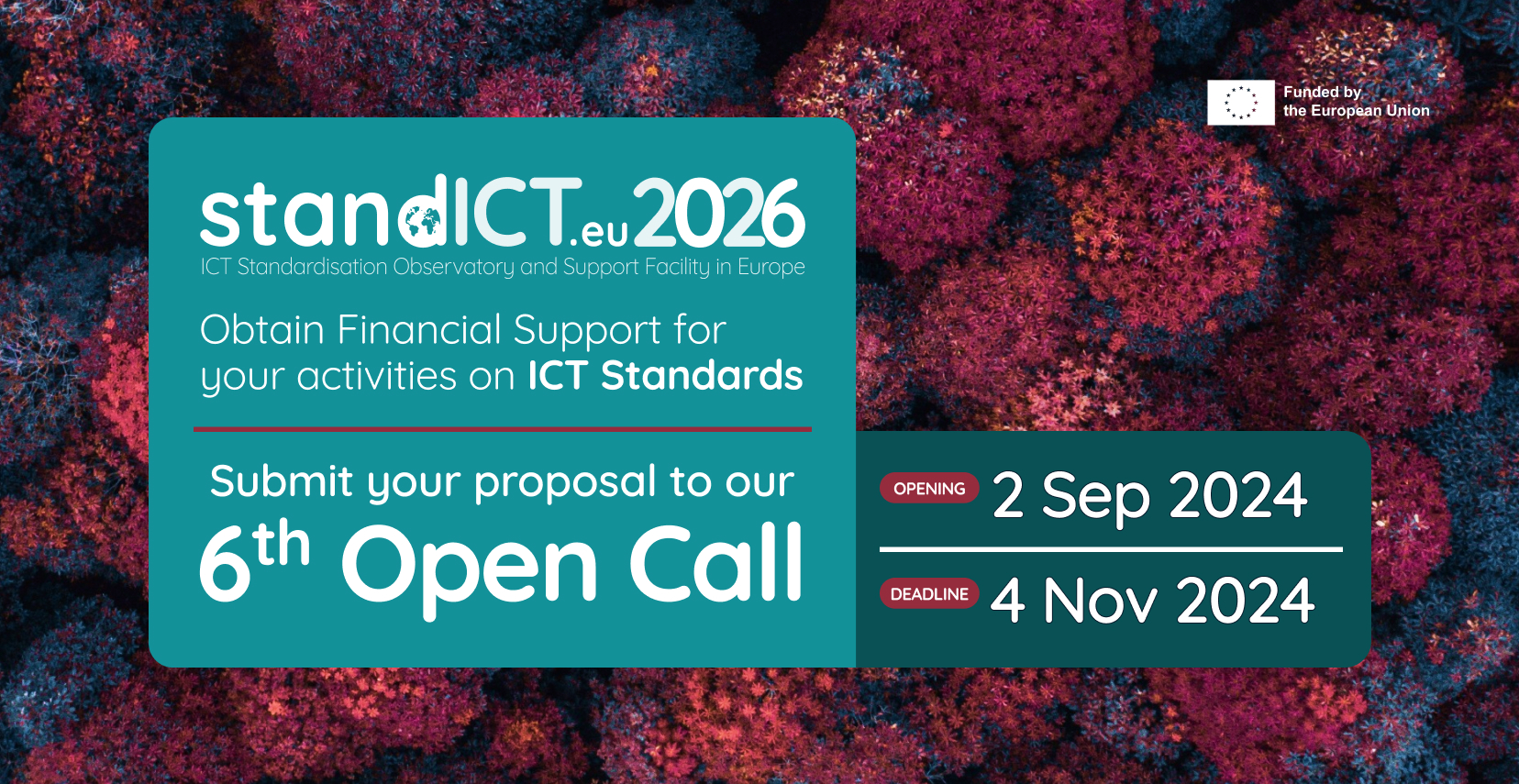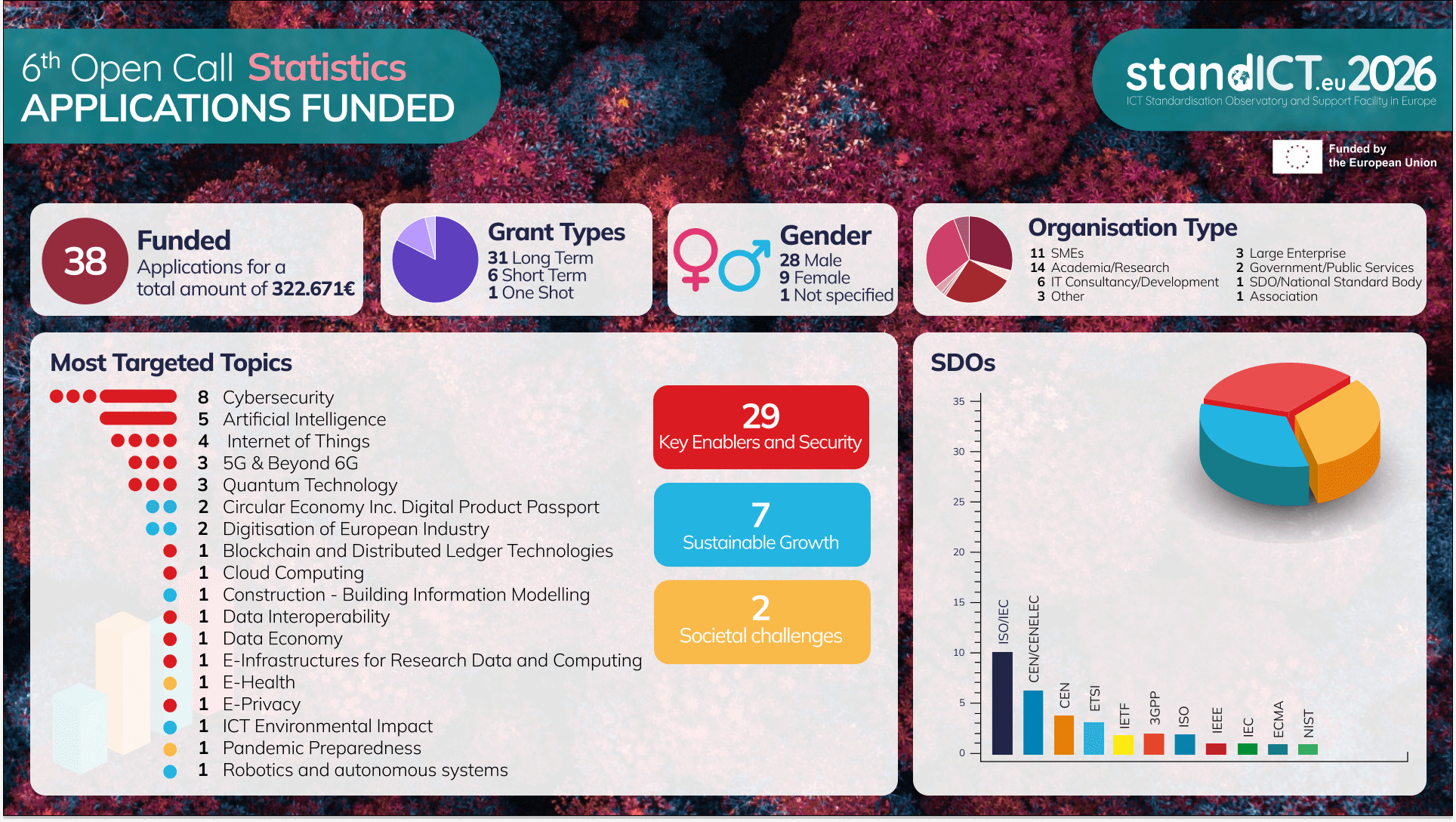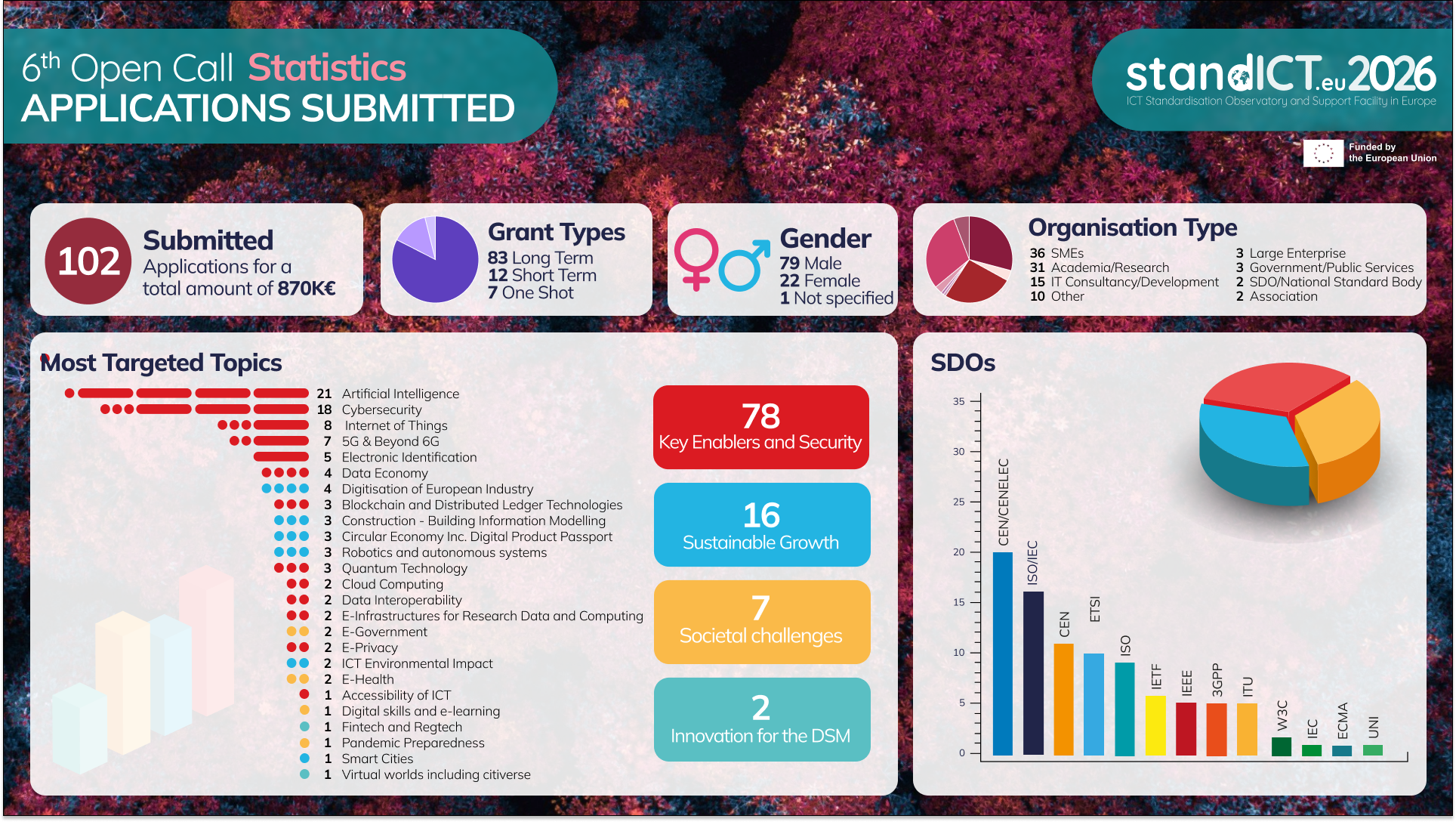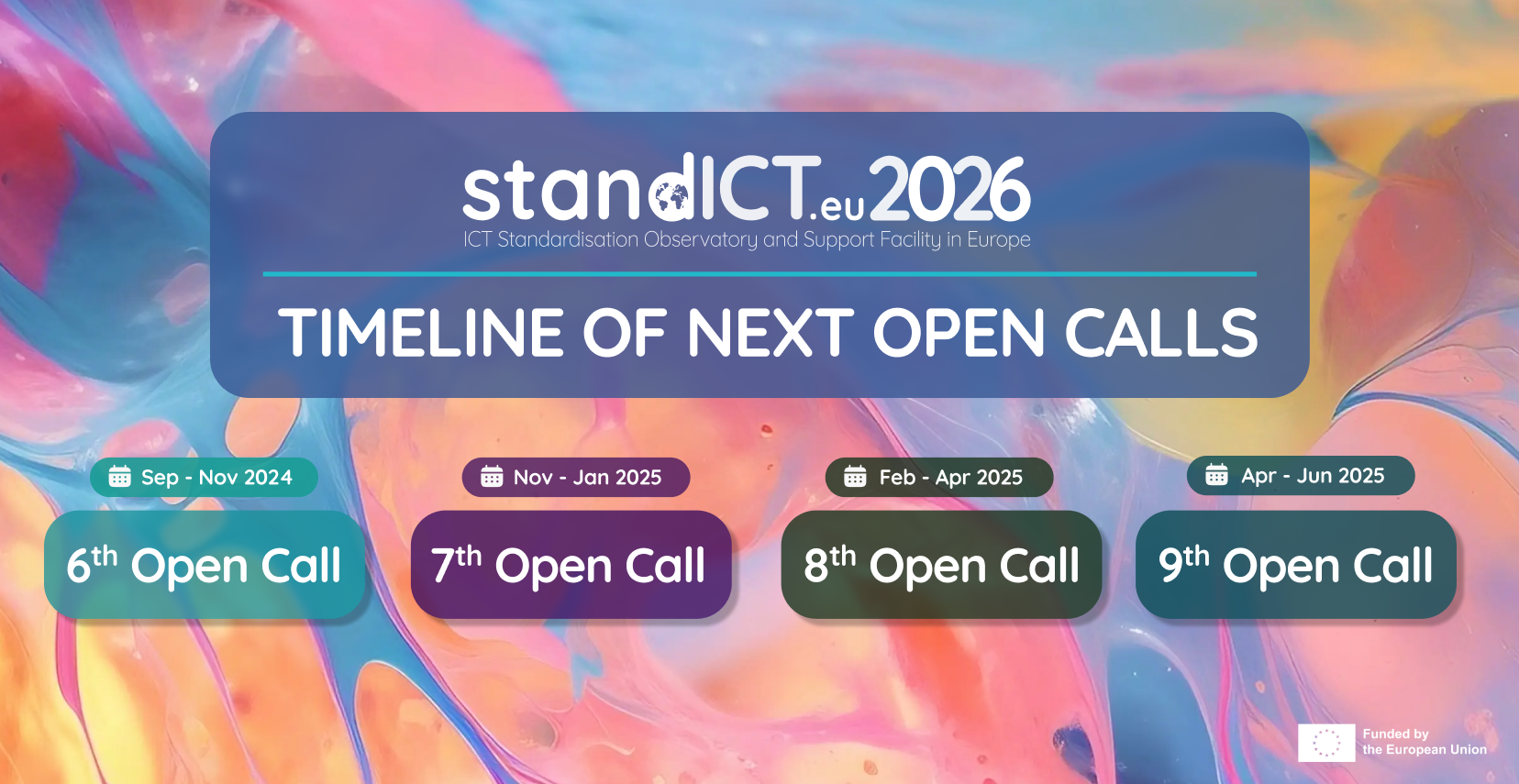
StandICT.eu will provide € 2,925,000 of crucial funding to support the participation of European standardisation specialists in key international and global SDOs. Through nine open calls this funding will enable the specialists to contribute to and help create a fully integrated European Standardisation Ecosystem, thereby strengthening Europe's position in global standardisation initiatives.
Please note that in order to proceed with the application, you need to sign in with your existing credentials or you will need to register to the StandICT.eu website. If you have already signed up to the website, please login with your credentials and come back to this page.
Don't have an account yet?
Register to StandICT.eu
The topics and priorities for the series of StandICT.eu 2026 calls which will run from May 2023 until April 2025 are defined through continuous monitoring and careful analysis of the international ICT standards landscape with the involvement of Standards Development Organisations (SDOs) and National Standards Bodies (NSBs), key EC advisory groups including the High-Level Forum on European Standardisation (HLF) and the EU Multi-Stakeholder Platform for ICT Standardisation (MSP), and respected bodies such as StandICT.eu’s Expert Advisory Group (EAG) and Forum for European Strategy on ICT Standards (FOREST).
The standICT.eu consortium has implemented the main guidelines for applicants who are interested in applying to standICT.eu Open Calls. Check the guidelines for applicants
This open call closed on 4th November 2024, 17:00 CET.



- 6th Open Call Topic Priorities
-
Applications that address any of the topics mentioned below taken from the Multi-Stakeholder Platform Rolling Plan for ICT Standardisation will be considered of equal validity and merit during the evaluation process.
Due to their current strategic importance applications focusing on the topics of Metaverse and Digital Product Passport are highly encouraged.Topics list:
- FOUNDATIONAL DRIVERS
- Data Economy
- Cybersecurity/Network and Information security
- E-Privacy
- KEY ENABLERS
- 5G and Beyond (6G)
- Cloud and Edge Computing
- Data interoperability
- IoT Internet of Things
- Electronic identification and trust services (including e-signature)
- E-infrastructure for data and computing intensive service
- Broadband infrastructure mapping
- Accessibility of ICT products and services
- Artificial Intelligence
- European Global Navigation Satellite Systems (EGNSS)
- Quantum Technologies
- SOCIETAL CHALLENGES
- Digital health, healthy living and ageing
- Digital skills
- Digital learning
- E-Government
- E-call
- Pandemic Preparedness
- Safety, transparency and due process online
- Emergency communications and public warning systems
- INNOVATION FOR THE DIGITAL SINGLE MARKET
- E-Procurement
- E-Invoicing
- Retail payments
- Preservation of digital cinema
- FinTech & RegTech Standardisation
- Blockchain and Distributed Ledger Technologies
- Web 4.0 and virtual worlds
- SUSTAINABLE GROWTH
- Smart Grids and Smart Metering
- Smart and Sustainable Cities
- ICT Environmental impact
- European Electronic Toll Service (EETS)
- Intelligent Transport Systems
- Digitisation of European Industry
- Robotics and autonomous systems
- Construction building information modelling
- Common information sharing environment (CISE) for the EU Maritime domain
- Water management digitalisation
- Single European Sky
- U-Space
- Circular Economy including Digital Product Passport
- FOUNDATIONAL DRIVERS
- Open Call for Applications - Process and Timing
-
StandICT.eu will run 9 Open Call cycles. Each call will be open for 60 days for proposal submission. At the end of the sixty-day period all proposal received through the StandICT.eu grants platform will be screened for eligibility, evaluated by an external pool of evaluators (EPE) scored, and ranked for funding. This process usually lasts for approximately 35 days at the end of which all applicants shall be notified whether their proposal has been retained for funding or not and provided with access to a Consensus Report compiled by the EPE.
Please do note that each application is independently evaluated by three members of the EPE and undergoes quality control by a fourth member of the pool after consensus is reached to guarantee maximum fairness and transparency. As the EPE are highly-skilled experts whose qualifications are assessed through an open call process their decision is binding and any redress requests or complaints will be dealt with strictly in relation to the procedural aspects of the evaluation and not on the merits of scientific or technical judgement of the experts. - 6th Open Call timing
-
- Launch: 2nd September 2024; 09:00 CEST
- Deadline: 4th November 2024, 17:00 CET;
- Evaluation: Each proposal is evaluated by three members of the External Pool of Evaluators and after consensus the evaluation undergoes a quality check by a fourth member of the pool;
- Notification of Outcome: Applicants will be notified on the outcome of their proposal and provided with feedback from the External Pool of Evaluators in an Evaluation Consensus Report by mid-october 2024.
If your proposal is retained for funding, upon notification you will be provided with the information and instructions to prepare and sign the contract for the funding. Please note that a deadline of 10 business days from notification will be applied to confirm your intention to take up the contract to enable the funds to be re-allocated to other successful applicants.
- Who can receive financial support?
-
Potential applicants are Standardisation specialists, defined as professionals with proven expertise and experience in Standardisation activities e.g. previous contributions to standards developments, participation in various SDO groups working, previous or current chairs etc. in the respective priority area.
The target of StandICT.eu 2026’s Open Calls are European Specialists who:- Have profound knowledge in one of the priority areas supported by the open calls;
- Have experience regarding developments of standards, e.g., in SDOs, in reputable organisations and Standardisation communities, or when creating harmonised standards in open source developments;
- Are individuals or natural persons residing in European Member States and Associated Countries. The most recent information listing participating countries in Horizon Europe issued by the Commission at the time of writing (26/09/2023) can be consulted here EU Grants: List of participating countries (HE) V2.6 – 01.08.2023. Please refer to this document if you have any doubts as to your eligibility for funding. Please note that as Switzerland is no longer a third country associated to Horizon Europe, applications form individuals who reside in Switzerland are not eligible for funding. On the 7th of September a joint statement was released by the European Commission and the UK on political agreement for the UK’s association to Horizon Europe. The European Commission followed this announcement with a press release to provide further details on the agreement and the next steps for formalisation of the political agreement. This publication states that “as of 1 January 2024, researchers and organisations in the UK will be able to participate in Horizon Europe on par with counterparts from EU Member States”. The next steps are stated as approval by EU Member States before being formally adopted in the EU-UK Specialised Committee on Participation in Union Programmes. Therefore, while there is no formal update on UK status on EU Grants: List of participating countries (HE) V2.6 – 01.08.2023, mentioned above, applicants from the UK will be eligible to apply for funds from Open Call 2 onwards with a Work Programme starting in 2024, subject to formal approval of the EU-UK agreement as mentioned above.
- Are not receiving support from other instruments (PPPs, EU or national R&I projects) for the proposed activities. In particular, open calls will target representatives from SMEs and academia.
- Type of Contributions
-
Three types of proposals can be funded under the StandICT.eu 2026 Open Calls, as shown below
- Proposal type: LT – Long term contribution (with travel option)
- Description: Contribution to ongoing standards development as a chair, convener, rapporteur or member of an SDO WG. E.g. comments on standards development and drafts, attending meetings also as an observer, paying membership fees.
- Maximum Contract Duration: 6 months
- Funding Range: Up to €10,000
- Proposal type: ST – Short-Term contributions (with travel option)
- Description: Contribution to standards documentation e.g. liaison to WG, comments on standards drafts, participation at meeting paying membership or registration fees.
- Maximum Contract Duration: 3 months
- Funding Range: Up to €5,000
- Proposal type: OS – One-Shot contributions
- Description: Support to ensure participation at workshop or event (e.g., participant, observer, presentation)
- Maximum Contract Duration: 3 months
- Funding Range: Up to €3,000
Please do note that the maximum funding requested per proposal cannot exceed that indicated for the respective type of application (LT, ST, OT), nor can the duration exceed that indicated.
- Proposal type: LT – Long term contribution (with travel option)
- Eligible Costs
-
- Personal Working Effort (this cannot exceed the EU maximum daily rate of 450 Euro)
- Travel costs
- Event registration fee(s)
- Membership fee(s) for SDO & SSO organisations
- Evaluation Criteria
-
The initial eligibility screening will be undertaken by the Consortium to assess compliance to the call. Proposals which are ineligible for any reason or which do not meet the call criteria will be identified as such and the applicant will receive an automatic notification from the system. The consortium will consolidate all eligible proposals and submit them to the external evaluators (selected from the External Pool of Evaluators – EPE) to undertake the formal evaluation.
The proposals will have to clearly demonstrate:- Added value to existing SDO activities;
- Impact of work on European interests and the standard in question;
- Expertise of the applicant in the respective priority area;
- Expertise of the applicant in standardisation, e.g. previous contributions to standards developments, participation in other groups working on architectures, APIs, guidelines in the respective priority area
Evaluations (for each proposal) will be performed using the following, four criteria principle (with a core score from 1 to 10):
- Criterion 1: Soundness of the proposal and foreseen impact on ICT Standardisation (30%);
- Criterion 2: Technical excellence & relevance of the activities proposed (30%);
- Criterion 3: Experience and qualifications of the applicant (20%);
- Criterion 4: Economics of the proposal (20%).
The final scoring and ranking will be automatically determined by averaging the scores provided by the three independent members of the External Pool of Evaluators. In the event of a tie between 2 or more proposals, the proposal bearing the earliest “time stamp” of submission will be eligible for funding.
- StandICT.eu SME Mentorship Programme
-
StandICT.eu has recently launched a mentorship programme, in order to accompany SME experts benefiting from StandICT.eu support into the standardisation ecosystem. More experienced experts (and notably returning StandICT.eu fellows) are given the possibility to be voluntarily put in contact with new fellows, matching their areas of expertise. This one-to-one mentorship programme aims to enable new coming SME experts with less experience of the details of the work to carry out in SDO technical committees to benefit from tips and advice from more experienced fellows. This also gives the possibility to experienced standardisation experts to diffuse their knowledge to a new generation of European experts, and enable the European Union to maintain a strong standardisation knowledge base for the years ahead. The mentorship may come through any way the mentors see fit – whether through one-to-one exchanges, sharing of resources, or invitations to relevant meetings and conferences, where the mentee can get introduced to fellow peers. A new question can now be found in the general application form, asking whether the applicant is interested in participating in this mentorship programme – either as a mentor, or as a mentee. The StandICT.eu team will then proceed to match the interested funded fellows from each new Open Call on the base of similar topics of expertise, and monitor the process. A feedback session will be organised at the end of the fellowship, in order to positively take stock of the various experiences and apply the required changes for the next Open Call cycle.” If agreed upon by the participants, a success story displaying the fruitful process between the mentor and the mentee will further be displayed on the StandICT.eu website, giving additional credit and visibility to the participants which accepted to take time in participating in this programme.